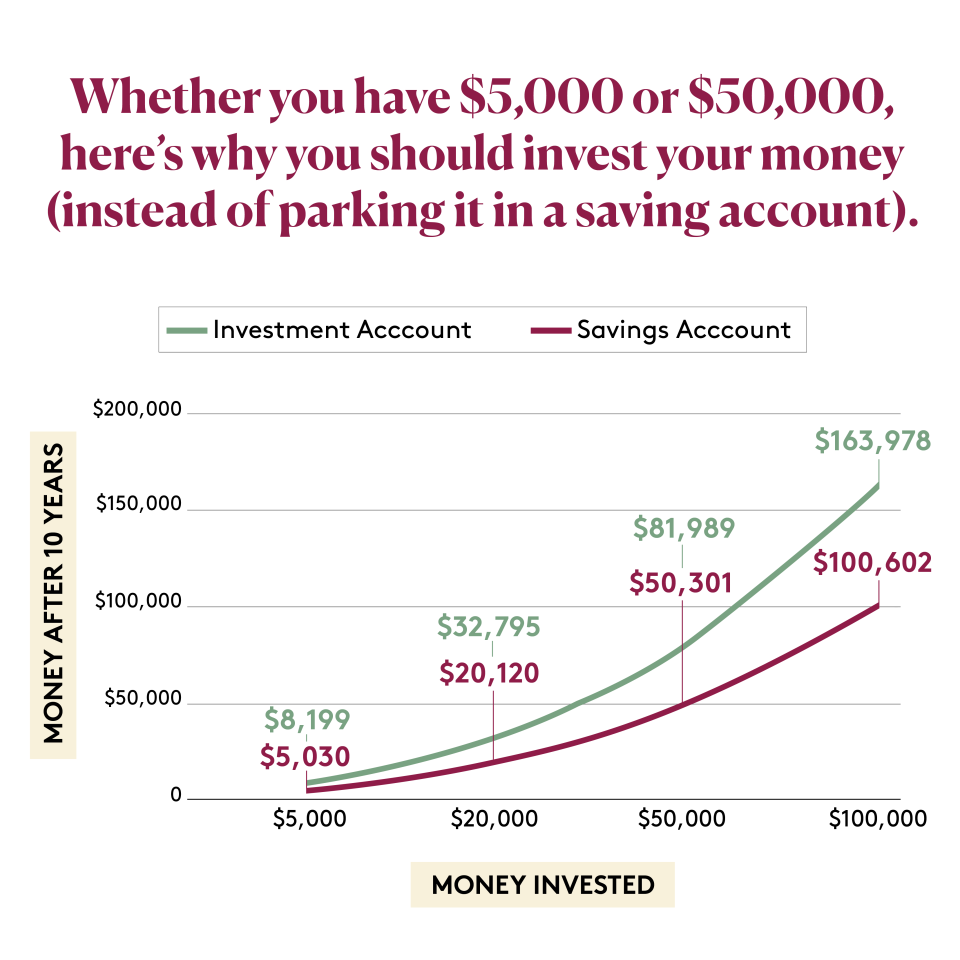For the First Time Ever, Women Are Outperforming Men in the Stock Market—Here's What's Changed

Alice Morgan
Investing has long been viewed as a man's world, one that women have historically shied away from. As a result, the accumulation of wealth among women has lagged behind that of men, with many women reaching retirement not nearly as financially prepared as their male counterparts.
Now the good news: The tide is finally turning.
A new study from Fidelity titled Women and Investing reveals some very promising changes emerging. Some of the most exciting highlights include:
Women are investing in record numbers. Two-thirds of women (67 percent) are now investing savings accumulated outside of retirement and emergency funds in the stock market. That figure represents a 50 percent increase since Fidelity first started conducting this particular study in 2018.
There's been a 43 percent increase in women opening new retail investment accounts since just last summer.
And here's the most intriguing data point of them all:
When women do invest, they see impressive results. An analysis of more than 5 million Fidelity customers over the last 10 years finds that, on average, women outperformed their male counterparts by 40 basis points. In other words, women are earning a higher rate of return on their investments than men.
There is so much good news in this data, it's hard to know where to begin really. How did we get here? What does it mean for women's wealth over the long term? And where do we go from here?

Alice Morgan
To unpack these important questions, we spoke with Fidelity's Lorna Kapusta, head of women investors and customer engagement. Here's a closer look at what it all means.
How did we get here?
Back in 2018, Fidelity began noticing an uptick in women becoming more hands on with their finances. Women of all generations, it seemed, were on something of an economic and education trajectory that continues to get stronger with each passing month and year, says Kapusta.
And remarkably, that financial engagement and growth intensified even during a global pandemic that disproportionately impacted women in terms of financial stress, job security, and the daily demands of life and family caregiving.
In fact, it seems that the events of the past year and a half may have proven to be a powerful catalyst, one that inspired still more women to make finances a top priority, including building up emergency savings, creating or updating financial plans, and even making the move from saver to investor.
Fidelity says it has seen an increasing commitment to saving and investing among its customer base during the past year. And among women in particular this has included contributing a record-high average of 9.2 percent to workplace savings accounts.
"The momentum we were seeing back in 2018 has accelerated due to pandemic. It gave everybody an opportunity to take a step back and think about their priorities," explains Kapusta
That thought process included women realizing that they want their money to actively make money, in order to help them achieve goals. At the same time, the shift to many of us working from home for the first time created an opportunity to spend time learning about investing, personal finance and more, says Kapusta. For instance, there was a 37 percent increase in women taking advantage of Fidelity guidance during the course of the pandemic.
What does it all mean for women's long-term wealth?
The fact that scores of women are now actively investing money instead of squirreling it away in a savings account (as women have historically had a tendency to do) is no small detail or accomplishment. This single change in habit can have profound financial ramifications, especially over the course of 10 years or more, says Kapusta.
Fidelity crunched the numbers to provide an eye-opening example of how much financial gain can be realized by simply shifting money from a savings account to a conservative investment mix. The difference is startling.
$5,000 in a savings account would earn about $30 over the span of a decade. Invested in the stock market via a conservative mix the earnings potential for that same sum of money in an average market is $3,199.
$20,000 stashed in a basic savings account will realize about $120 in growth over a decade, while in an average stock market that money would return $12,795.
$50,000 in basic savings would provide about $301 worth of growth over 10 years, but in a conservative investment mix the return would be about $31,989.
$100,000 in basic savings might result in $602 worth of growth over a decade, but in the stock market that money would have returned a staggering $63,978.
These four estimates are based on the stock market's historical performance. Now consider this example in light of the newest revelation from Fidelity's 2021 Women and Investing study—that women are earning significantly higher rates of return then men. Over 10 years, that reality can translate into a very lucrative return for women.
Why are women outperforming men?
A variety of factors are contributing to the success women are having with their investments, says Kapusta. And it's worth taking note of what those factors are.
"Women are smart and thoughtful, and they approach investing in a much more holistic way," explains Kapusta. "They think about the overall picture: What is important to me? And what am I trying to achieve? And for who?'"
When women invest, they also tend to take a very steadfast approach, continues Kapusta.
"They follow a consistent strategy of investing from their paycheck on regular basis," says Kapusta. "They also have a plan, and they stick to their plan. Versus the trading behavior of men, who buy and sell with much greater frequency or at a higher rate than women."
Where do we go from here?
While more women than ever are recognizing the power of investing and taking steps to help their money grow more aggressively, there are still many more women to be reached. Plenty among us continue to keep significant amounts of cash (above and beyond our emergency savings) in bank accounts, earning minimal interest, and thus missing out on thousands of dollars in earnings.
Fidelity's study bears this out, showing that roughly half (47 percent) of women report having $20,000 or more in savings outside of retirement and emergency funds, a third (31 percent) have $50,000 or more, and approximately one in five (18 percent) have $100,000 or more.
In other words, amid all of the exciting progress, there remains a great deal of work still to be done. Kapusta and other stress the need to reframe how many women think about investing in order to fuel continued momentum.
For instance, only four in 10 women say they're comfortable with their knowledge surrounding investing. In addition, 65 percent of women say they'd be more likely to invest, or to invest more, if they had clear steps to do so.
"There's been a lot of news around women not feeling as confident and believing that men are better at investing," says Kapusta.
A separate study (this one from Merrill) found that only about half of women (52 percent) say they're confident about investing, compared to 68 percent of men.
To help address these hurdles, we must normalize the conversation around money, bringing it out in the open and ensuring that women have the support and tools they need to get engaged in investing.
But it is equally important to begin recognizing and repeating loudly and proudly: women are just as good as men at investing, if not better in plenty of cases.
So perhaps we also need to reframe how women think about their own capabilities with regard to money and investing. As Kapusta herself—and now the statistics—make abundantly clear, that lack of confidence that continues to plague so many women on this particular issue is completely unfounded.
"We've got to give women kudos, when they do take action, things go well," says Kapusta.

